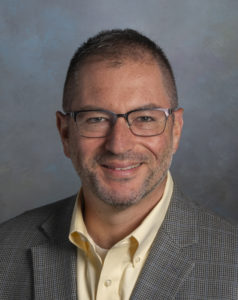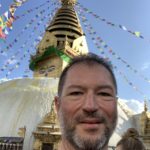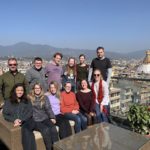As a student, David Rettinger witnessed his peers cheating. Sometimes he even felt tempted to do it himself.
Instead, he dedicated his career to understanding the psychology behind academic misconduct.

Professor of Psychological Science and Director of Academic Integrity Programs David Rettinger
A professor of psychological science at University of Mary Washington since 2006, Rettinger also serves as director of Academic Integrity Programs and faculty advisor to UMW’s Honor Council.
“My mother was a market researcher, so I’ve always been interested in studying human behavior,” said Rettinger, who hails from New York City and earned a bachelor’s degree from University of Michigan at Ann Arbor and a master’s and Ph.D. from University of Colorado.
When he first began teaching, Rettinger had a colleague who was researching academic integrity. Fascinated, he decided to apply his own methods to the field. “That led to some collaborative projects on cheating, and my interest has never faded.”
Rettinger’s passion for studying plagiarism led to a two-year stint as president of the International Center for Academic Integrity. He currently chairs ICAI’s Research and Assessment Committee, where his work on an international student survey comes at a critical juncture, given the rise in contract cheating websites and complex challenges caused by remote learning. The combination of stress, lack of support and looser academic structures have made cheating more tempting for students, he said.
Rather than placing all the blame on technology, Rettinger said it’s important to address the disconnect that often happens between faculty and students regarding assessments and expectations. At UMW, for example, the Honor Council has added more faculty advisors in the last decade to guide students in making good decisions moving forward, he said, resulting in fewer repeat offenders.
“We often meet students on their worst day of their college careers. It’s rewarding to know we can help them learn from their mistakes and grow.”
- David Rettinger in Nepal, where he’s taken UMW students as part of a course called “International Perspectives on Civic Engagement: Nepal,” which he teaches with CPR Associate Professor Dan Hirshberg.
- Professors David Rettinger (back row, left) and Dan Hirshberg (back row, right) with students on a study abroad trip to Nepal.
Q: What might people be surprised to learn about you?
A: I used to lead canoe trips for pre-teens and still keep in touch with many of them decades later.
Q: You’ve tweeted a lot of famous chefs. Have you ever gotten a response?
A: Tom Colicchio (from Top Chef) shared some advice with my daughter, who is learning to cook. I see cooking as a window into the cultures and lives of people around the world. I’ve also reached out to Michael Twitty, a food scholar and chef with local ties, whom I look to on social media to help expand my world, rather than stay in my own echo chamber.
Q: What’s the best thing you’ve cooked during quarantine?
A: I experimented with a Thai curry that was very memorable. I think it was the full-fat coconut milk.
Q: What do you like best about the UMW campus?
A: On a warm Friday afternoon, the buzz on Campus Walk is just magical.
Q: What’s your favorite thing in your office?
A: I have a hand-woven carpet I bought in Kathmandu on a study abroad trip to Nepal. It reminds me of fun times of the past and those to come.
Q: What’s your motto?
A: The summer camp where I went as a kid and worked during college has one I’ve adopted: “Help the other fellow.”

